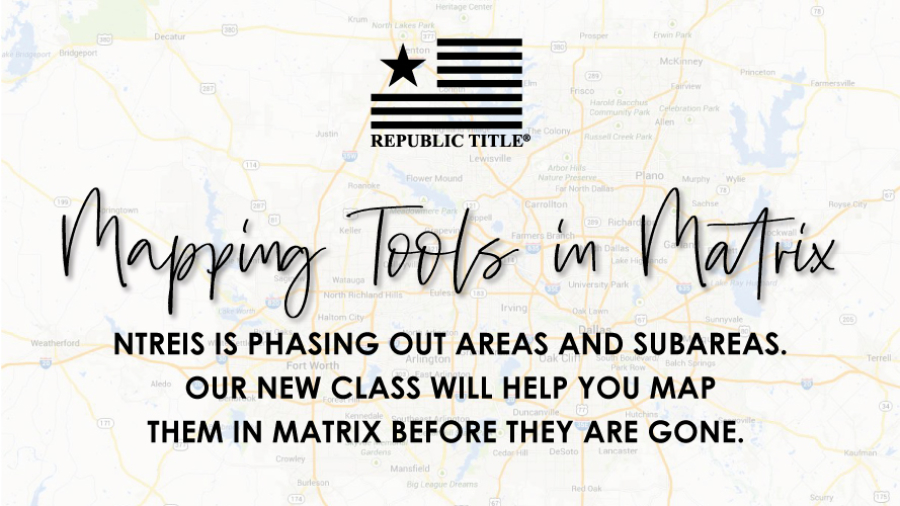Republic Title is pleased to offer a variety of continuing education classes for our customers. Join us in September for classes including:
The Real Deal – Mastering the TREC One to Four Family Residential Contract
This class will cover the basics of the Contracts and Addenda you’ll need to submit each time you write an offer. We will walk through the TREC 1-4 Family Contract and learn about the parts that can make or break your offer so that you can be prepared to write the strongest contracts possible for your clients.
September 6th
10:00 am – 11:00 am
Zoom (This class is offered for informational purposes only, TREC CE is not available.)
Back-up, Contingent and Multiple Offers
This class will prepare licensees to handle the unique aspects of backup, contingent and multiple offer transactions by reviewing pertinent TREC addenda along with critical dates and deadlines. APPROVED TREC CONTRACT-RELATED COURSE
September 8th
10:00 am – 11:00 am
Zoom
The Real Deal – Getting to Know Lender Products
September 13th
10:00 am – 11:00 am
Zoom (This class is offered for informational purposes only, TREC CE is not available.)
Social Media Content Planning 101
All good social media begins with a plan. Join us to learn how effective content planning and execution will keep you top of mind with your sphere and help you win more business. In this class, you will learn tips for social media content planning, where to find great content resources, and planning tools to help you organize your social media content calendar.
September 14th
10:00 am – 11:00 am
Republic Title Park Cities
Is This Homestead and Why Do Title Companies Care?
Homestead rights can be very confusing! This class will help licensees understand how the State of Texas views homesteads and what factors influence the title company’s underwriting decisions.
September 15th
10:00 am – 11:00 am
Zoom
The Real Deal – Mastering Your MLS Dashboard
In this class we’ll explore the NTREIS MLS Dashboard and you’ll learn about all the vital tools that can help grow your business and some basic tips on how to get started.
September 20th
10:00 am – 11:00 am
Zoom (This class is offered for informational purposes only, TREC CE is not available.)
Attract New Clients using MLS Tools
Join us and discover a number of ways to use the tools provided by the MLS to help with consumer interest which can likely turn into sales and full-fledged customers.
In person only. NOTE: This class will be taught hands-on. If you would like to follow along during class, please bring your own laptop* (*smart phones and iPads will not work).
September 22nd
10:00 am – 12:00 pm
Republic Title Southlake
Taxation and the Real Estate Agent
This class will cover issues to help REALTORS® with their personal taxes, with removing Federal Tax Liens when closing sales, and with IRS problem they or their client may have. Some of the topics discussed in this one-hour class include: Tips on Keeping Records & Recommended Forms to File, Tax Deductions You Should be Taking, How to Make Estimated Taxes Work with your Cash Flow, Tax Areas of Special Interest to REALTORS®, and How to Use the Home Office Deduction.
September 22nd
Lunch – 11:30 am – 12:00 pm
Class – 12:00 pm – 1:00 pm
Republic Title Preston Frankford
Mapping Tools in Matrix
One of the strongest tools available to NTREIS MLS Subscribers is the mapping tool in Matrix, but are you using it to its fullest ability? In this class, licensees will explore all the map tool functions in Matrix so you can create powerful searches for your clients who want to live in specific neighborhoods, near points of interest or certain distances to where they work.
September 23rd
10:00 am – 11:00 am
Zoom
Appraisals 201 – Perfecting the CMA Process – Presented by Supreme Lending
Take the guesswork out of the CMA process by learning how to make adjustments from an appraiser’s point of view. This one hour class will be presented by Sean Bone of Supreme Lending.
September 27th
10:00 am – 11:00 am
Republic Title Southlake
The Real Deal – zipForm and Digital Signatures
In this class we’ll take a look at the technology tools that enable real estate agents to quickly and efficiently create digital transaction files, complete and fill in contract details, attach documents and even get them electronically signed by buyers, sellers and other parties involved in a real estate transaction.
September 27th
10:00 am – 11:00 am
Zoom (This class is offered for informational purposes only, TREC CE is not available.)
To see a current list of available classes and to register, please visit www.republictitle.com/residential-education.















